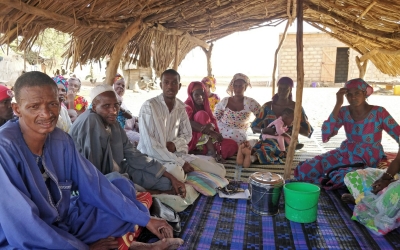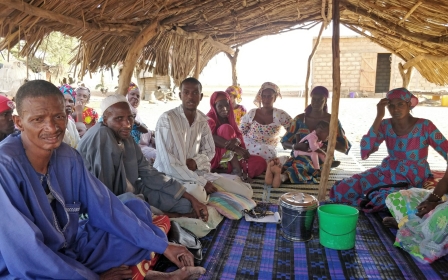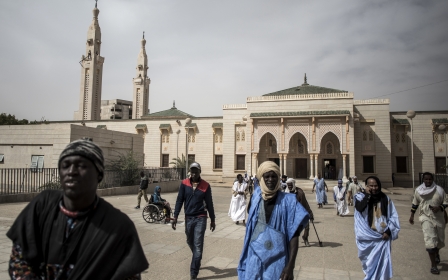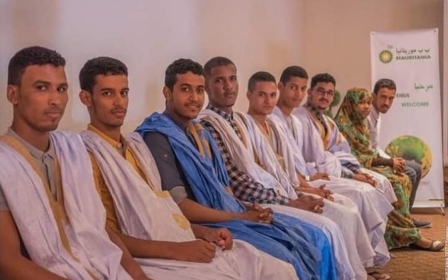Black Mauritanians protest against US racism, after fleeing racial violence at home
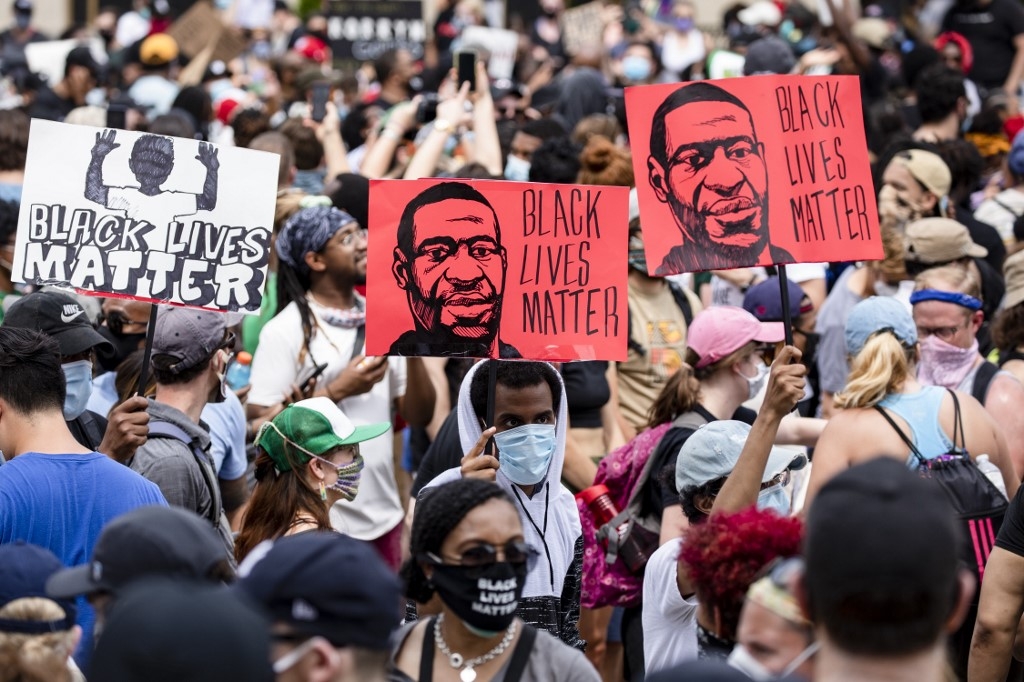
Few of those gathered outside the White House last Monday evening would have noticed Cherif Sanghott’s 12-year-old son, Abdoul, as he gently waved his banner in protest in the US capital.
Fewer yet would have recognised its significance.
Dressed in African print trousers and a blue top with characters from Fortnite, his favourite computer game, Abdoul smiled shyly from behind a surgical mask as he held his banner aloft before the official residence of the president of the United States.
“RIP” and “No Justice no Peace”, it read in the blue ink of a faded marker pen. But next to the name of George Floyd, whose killing more than a week ago sparked a wave of global protests, was another: Abbas Diallo.
In red writing at the bottom were the words: “Stop the killing in USA & Mauritania.”
Floyd’s killing by white police officer Derek Chauvin has resonated strongly with the Black Mauritanian community in the US, many of whom - including Cherif - fled the West African nation because of racial violence.
Today, after France, the US is home to the second-largest Mauritanian diaspora in the world.
But as a Black community in the US, they have also faced American racism, from police harassment to discrimination at work.
'I’m participating in the march to help this racism to end. I want my kids to grow up in peace and not in a society where they are judged because of the colour of their skin'
- Cherif Sanghott
Now Cherif has set out to teach Abdoul about the realities of racism back in Mauritania, and prepare his young son for what could lie ahead in the US.
“I’m participating in the march to help this racism to end," he told Middle East Eye.
"I want my kids to grow up in peace and not in a society where they are judged because of the colour of their skin.
“I don’t want them to be sad because they’re black.”
Silent death
Cherif took the opportunity to pay tribute to Abbas Diallo, a Black Mauritanian, who was gunned down by security forces in the country’s south late last month, dying a silent death that did not attract any publicity.
The father of six had tried to make easy money by driving merchandise over the border to Senegal in violation of coronavirus restrictions.
Security forces sighted the car and fired shots in the air, bringing it to a screeching halt.
They approached the vehicle as Diallo desperately tried to explain himself, but fired again, this time into his chest, and killed him.
“I wanted people to be aware of him. Nobody deserves to be killed because they’re trying to feed their family. He didn’t have any guns or any weapon,” said Cherif.
Black Mauritanian leaders told MEE last month that their already poverty-stricken communities had been hard hit by the coronavirus lockdown and that they had been unable to work.
Clashes between security forces and Black Mauritanians are common.
Videos emerged last month of police beating unarmed Black Mauritanian protesters in the streets, while police brutally suppressed nationwide protests following presidential elections last June as some Black Mauritanians rejected the results.
Black Mauritanians make up the bulk of the country’s four million population, and like African-Americans, say that racism is deeply embedded within the country’s institutions
A 2009 report by the UN found that the society has been “deeply marked by continuing discriminatory practices of an ethnic nature…. pervasively present in social structures, the principal institutions of the State, in particular the armed forces and justice system, and attitudes.”
Since Mauritania won independence from France in 1960, an Arab-Berber elite has come to dominate every sphere of society - from government, to business, to religion - securing its grip through discriminatory “Arabisation” policies.
But the spectre of solidarity between Black Mauritania’s communities has hung over the head of the powerful Arab-Berbers, a minority who account for just 30 percent, leading to divide and rule tactics and efforts to reduce the Black population.
This is something Cherif is painfully aware of.
Driving through Washington each morning, observing the ranks of national guard and police poised at the ready for word from a president who has already threatened violence against the Black Lives Matter movement, reminded him of Mauritania in the late 80s, as the country’s racial powder keg threatened to explode.
'De facto slavery'
As an ethnic Fulani, Cherif belongs to one of a number of Black African ethnic groups which together make up 30 percent of the country’s population.
The balance is made up by the Haratin, the poor Black descendants of slaves once owned by the Arab-Berber population. Half still live in conditions of “de facto slavery,” according to the UN.
Through the 80s, the country’s Arab-Berber-led government intensified its purges of Black Africans from the administration, and from the farms they occupied in the country’s fertile south.
The government's Arab-nationalist Baathist ideology was strongly influenced by Hafez al-Assad of Syria and Saddam Hussein of Iraq - brutal authoritarians in their own right.
Matters came to a head in 1989 when tens of thousands of Black Africans were rounded up and expelled to neighbouring Mali and Senegal.
Hundreds of villages were set ablaze, prized cattle seized and women raped as the country’s Black African population was reduced by an estimated eight percent.
It was the Haratin, prodded along by their erstwhile masters, who conducted the pogroms, before settling on the fertile farms vacated by fleeing refugees.
Political campaigner
Amid the lawlessness and impunity, Cherif, who was in his late teens, was also expelled.
It happened after a police officer took a liking to a young woman Cherif had been dating. When he refused to step aside, he was threatened.
“He told me he would deport me,” said Cherif. “And that’s what he did.”
The officer arrived with a colleague and took him away. After four years in Senegal he returned in 1993, and became a campaigner for PLEJ, the first political party to represent Black Mauritanians.
He moved to the US soon after. But even there, Black Mauritanian’s still face racism, said Abdoulaye Sow, who fled to the US after what survivors call the “genocide” of 1989.
“We feel the discrimination directed at all blacks in the US in every aspect of our lives," said Abdoulaye.
"We get pulled over by the police. We feel it when we apply for jobs and when trying to get promoted.
"We feel it everywhere and we just have to deal with it because home is worse.”
'I'm optimistic'
This weekend, Cherif took Abdoul to further protests and remains upbeat about their outcome.
“There are going to be some changes. It’s not going to be a hundred percent change but I’m optimistic there are going to be some real changes this time,” said Cherif.
'We feel the discrimination directed at all blacks in the US in every aspects of our lives. We feel it everywhere and we just have to deal with it because home is worse'
- Abdoulaye Sow
But when asked what Abdoul would like to be when he grows up, Cherif laughs, before saying, remarkably: “He said he wants to be a police officer.”
Cherif puts it down to the influence of the computer game Fortnite.
“It’s this game they play every day I was going to take them off it,” he said.
In a short video about his future plans, Abdoul is asked by his father why he wants to become a police officer. “So I can help people,” he replies.
Asked if he would ever shoot people, he says "no". When asked why: “Because I don’t want to go to prison,” he says.
Middle East Eye propose une couverture et une analyse indépendantes et incomparables du Moyen-Orient, de l’Afrique du Nord et d’autres régions du monde. Pour en savoir plus sur la reprise de ce contenu et les frais qui s’appliquent, veuillez remplir ce formulaire [en anglais]. Pour en savoir plus sur MEE, cliquez ici [en anglais].


